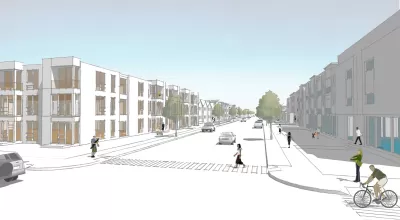Recent analysis from the Pew Research Center identifies more support for zoning reform as a tool for maintaining the affordability of rental housing in U.S. cities.

Four U.S. jurisdictions—Minneapolis; New Rochelle, New York; Portland, Oregon; and Tysons, Virginia—helped slow rent growth by approving new zoning codes that allowed more residential development, according to a recent article by Alex Horowitz and Ryan Canavan for the Pew Research Center.
“The Pew Charitable Trusts examined the changes in these four jurisdictions because they all have received attention for revising their formerly restrictive zoning codes and allowing more housing,” according to the article. “This finding from the four jurisdictions examined supports the argument that updating zoning to allow more housing can improve affordability.”
The evidence from these four cities argues that market-rate housing development is sufficient in helping slow rent growth. “In all four places studied, the vast majority of new housing has been market rate, meaning rents are based on factors such as demand and prevailing construction and operating costs,” according to the article. “The evidence indicates that adding more housing of any kind helps slow rent growth.”
A separate study by the Urban Institute, published just a few weeks earlier, found similar results, adding fuel to the zoning reform cause in one of the most hotly debated topics in contemporary planning.
Pew used data Apartment List Rent Estimate data downloaded on March 22, 2023 to perform the analysis, which can be read in its entirety at the link below.
FULL STORY: More Flexible Zoning Helps Contain Rising Rents

Maui's Vacation Rental Debate Turns Ugly
Verbal attacks, misinformation campaigns and fistfights plague a high-stakes debate to convert thousands of vacation rentals into long-term housing.

Planetizen Federal Action Tracker
A weekly monitor of how Trump’s orders and actions are impacting planners and planning in America.

Chicago’s Ghost Rails
Just beneath the surface of the modern city lie the remnants of its expansive early 20th-century streetcar system.

Bend, Oregon Zoning Reforms Prioritize Small-Scale Housing
The city altered its zoning code to allow multi-family housing and eliminated parking mandates citywide.

Amtrak Cutting Jobs, Funding to High-Speed Rail
The agency plans to cut 10 percent of its workforce and has confirmed it will not fund new high-speed rail projects.

LA Denies Basic Services to Unhoused Residents
The city has repeatedly failed to respond to requests for trash pickup at encampment sites, and eliminated a program that provided mobile showers and toilets.
Urban Design for Planners 1: Software Tools
This six-course series explores essential urban design concepts using open source software and equips planners with the tools they need to participate fully in the urban design process.
Planning for Universal Design
Learn the tools for implementing Universal Design in planning regulations.
planning NEXT
Appalachian Highlands Housing Partners
Mpact (founded as Rail~Volution)
City of Camden Redevelopment Agency
City of Astoria
City of Portland
City of Laramie





























